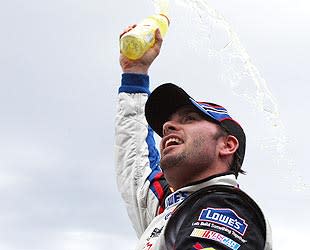CoT highlights driver talent
A few weeks ago while participating in a live chat for Yahoo! Sports, I explained my view that the high number of blown engines and pit road mistakes are directly related to the new car, and the fact that teams have very limited ability anymore of gaining an advantage with the car.

Jimmie Johnson's victory at Martinsville didn't hinge on him having the best car, but his ability to relay what he needed out of the car to his crew chief and then his ability to drive it home.
(Getty)
Since the introduction of the new car, the emphasis has shifted to other areas where opportunities to make gains still existed. The engine is one of those areas, as teams will always push the envelope to gain more power and more efficiency. Another area where potential gain always exists is getting on and off pit road quicker than your competitors.
Six races into the 2009 season, many teams have discovered the hard way that searching for gains in these two areas is simply not worth the risk. Therefore, the emphasis on winning races is focused on the two areas in which winning NASCAR races should ultimately be determined. The first is driver ability and talent. The second is each team's capacity to adjust the car during the race to make it better.
After explaining this on the chat, the next question was, "So you support skill in driving over skill in creating faster cars then?"
"Correct," I replied.
And I will now follow up with, "Why wouldn't you?"
Every now and then I get a fan who comes at me with the suggestion that NASCAR has destroyed the sport, the racing stinks, and why can't they put it back to the way it was in the old days, like the 1970s. My answer is always that back in the '70s the margin of victory was often measured in laps, not tenths of a second like it is today.
Could it be better today? Yes! It can always be better. And it will continue to get better as team owners maintain an emphasis on employing talented people as opposed to investing in mechanisms designed to escape the clutches of NASCAR inspectors – this is more commonly referred to as cheating, which, by the way, was fairly common in the '70s.
The race last week at Martinsville was pretty darn good. It was decided in the closing laps the old fashioned way – one driver trying to defend his position and the other attempting to take it from him.
In the end, it was won by the driver who had done a better job managing his tires and brakes for that critical push at the end. Or it was won by the driver willing to be most aggressive, or by the driver steering a better car because of the information he provided his crew during the race, allowing them to adjust a good automobile into a great one.
Whichever it was, it comes back to the driver who, to me, is a whole lot better explanation than the idea of each week's winner being the team that had the "best car."
In fact, during my visit to Martinsville Speedway last week, I heard one driver say, "Well, Kyle Busch had the best car at Bristol," as if the car alone was responsible for Busch carrying home the trophy and the $233,000.
I hope the young man reads this and believes me when I say Kyle Busch may have had one of the 10 best handling cars at Bristol, but that was a product of his ability to run fast laps in practice while giving detailed feedback to his crew to make his car go even faster. Also, Kyle Busch the driver played a pretty big role in the 18 car going to victory lane, much the same as Jimmie Johnson the driver had an influence in the 48 team winning last week – and five of the last six Martinsville races.
Of course these races should be decided based on the skill of the person behind the wheel. They also should be decided by the skill of the engine specialists with aptitude to tune an engine to maximum horsepower. Races should be influenced by pit road strategy or a team's willingness to gamble on fuel mileage late in the race.
Races should not be decided by teams with cars that have extreme advantages.
A decade ago we were all beaten in the Winston (now the All-Star race) by Jeff Gordon, driving a car they called T-Rex, which more resembled the Bat Mobile than anything else on the track. The car was so far advanced from anything we were running at the time that it (and Jeff) blew us all away.
NASCAR realized it had a problem on its hands, that if it allowed this sort of R&D machine on the track in a points race, it would have opened up Pandora's Box, pushing organizations to continually search for something newer and better.
This is why NASCAR shouldn't be criticized for restraining teams from being too creative. Costs would have exploded, some teams would have wound up spending themselves broke and what we would have today would be something akin to what we saw in the 1970s when margins of victory were measured by laps, not car lengths.
But with the Car of Tomorrow, we are now in an era where a driver's talent and his ability to manage all that goes on during a four-hour race has the greatest impact on who wins each week. I believe that's exactly the way it should be.
